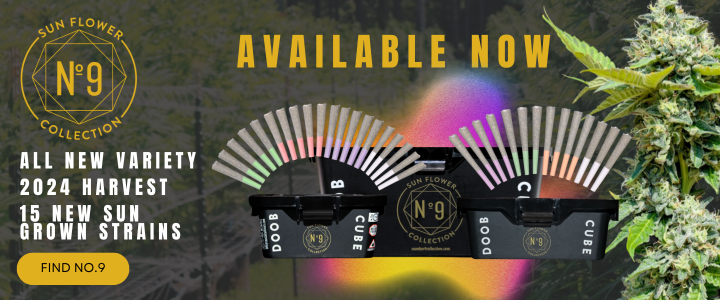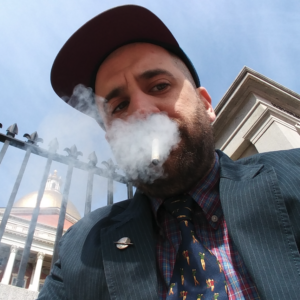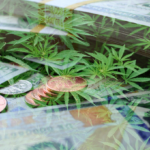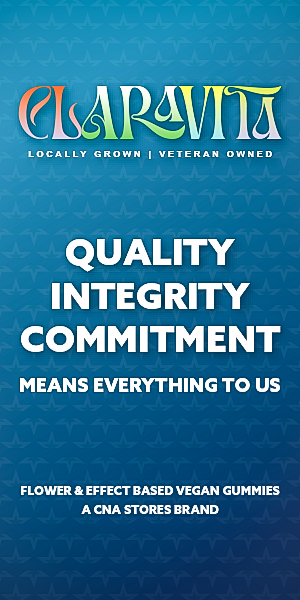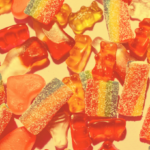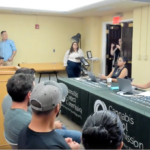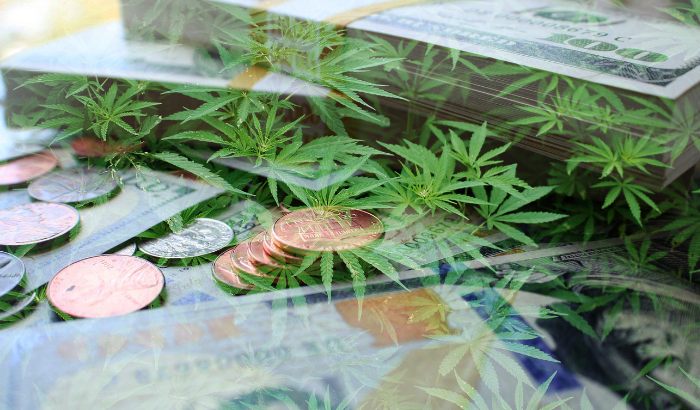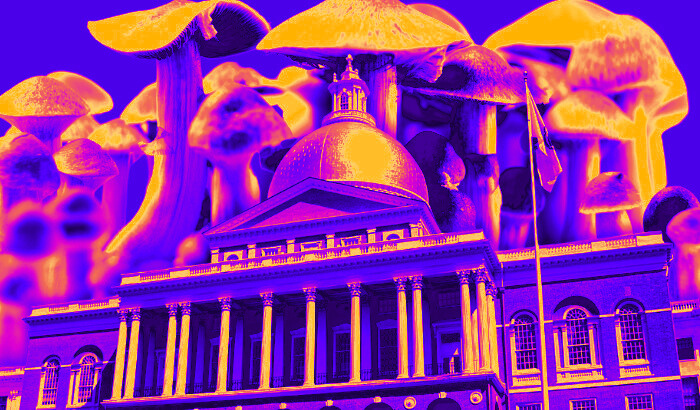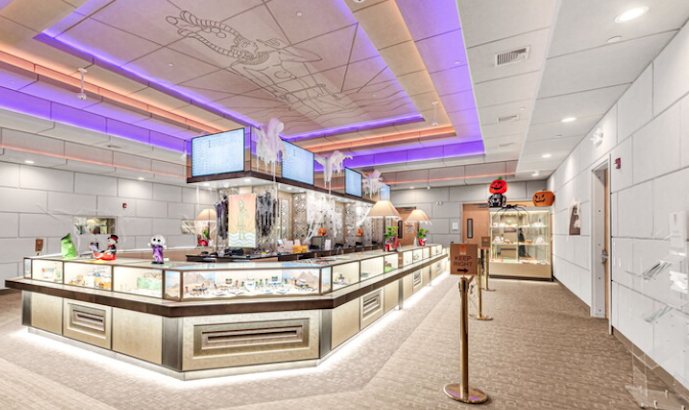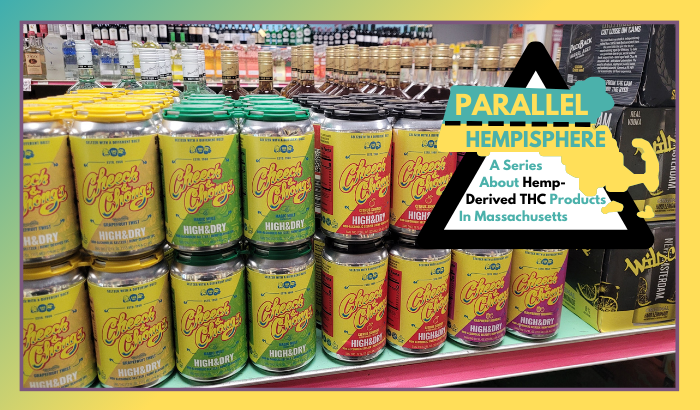
Before coming to New England, synthetic THC brands cut their teeth in prohibitionist red states where their products are often openly embraced
By Chris Faraone
with additional reporting by Dana Forsythe
Of the issues that are sure to summon debate throughout 2024, hemp-derived synthetic cannabinoids—and untold intersecting science, commerce, health, and legal hot potatoes—may prompt the most clamor. Our team at Talking Joints Memo enlisted ace culture reporter Dana Forsythe to help us survey the landscape and speak with stakeholders and experts to produce a series that untangles the topic. This third of five installments explores the spread of hemp products across the country. -TJM Editors
←Click here to go back to Part 2
This is the rare story in which Kentucky Senator Mitch McConnell starts out as a hero.
It is less rare in that the GOP minority leader turns out looking foolish. Or brilliant, depending on who you ask.
A manager at one of many liquor stores we visited across Mass for this series told us they often sell out of every last can of delta-9 liquid they get.
“I sold 40 cases in a day,” he said. (For his protection, we agreed to anonymize his store and the brands he is selling.)
We asked how many cases of Bud Light he sold on that same day.
“Less than half that,” the manager said. “I haven’t seen something this popular since Four Loko, and this has lasted longer.”
He wasn’t alone in recalling Four Loko nostalgia; we stopped in more than two-dozen liquor stores around Mass to chat about hemp-derived delta-9 drinks, and the 2010 flash-in-the-pan came up repeatedly. People walked into packies asking for Four Loko by name, and bought every tallboy they could get their hands on. But unlike the outlawed version of that fruity caffeinated alcoholic beverage, which was banned by Massachusetts regulators after widespread press-assisted hyperventilation over minors drinking themselves into the emergency room, forces have yet to triangulate against psychotropic hemp derivatives, most of which are demonstrably less dangerous than speedy malt liquor that tastes like fruit punch.
In states that have taken a hard stance against cannabis use, products containing synthetic THC started appearing in corner stores soon after the passage of the federal Agriculture Improvement Act in 2018. Better known as the US Farm Bill, the legislation removed hemp—a plant that is essentially the same as cannabis sativa minus the psychotropic effects—from the Controlled Substances Act, resulting in an alternative weed world where that now-legal hemp is chemically synthesized at mass scale into cannabinoids that actually get you high. Unlike regulated products that contain natural THC, they’re also sold across state lines.
“The federal law that is allowing delta-8 and all of these THC isomers was an extreme oversight by the federal government,” said John Nathan of Bay State Extracts. His company utilizes industrial hemp to isolate minor and rare cannabinoids for bulk supply to manufacturers, and they only deal with “naturally occurring non-psychotropic phytocannabinoids.” He continued, “When they legalized hemp, they did not know that delta-8 lollipops would be coming. That was 100% not their intent. It was literally just abusing verbiage in the law that said ‘derivatives.’”

Though only making waves in Mass of late, synthetics have already become big business elsewhere, including conservative red states that spurn cannabis. Remarkably, US Senate Majority Leader Mitch McConnell of Kentucky was the key member of congress behind the Farm Bill, declaring it a “victory for [hemp] farmers and consumers throughout our country.” As for how it’s playing out …
In Tennessee, lawmakers tried to ban hemp-derived products outright in 2022, but, as one outlet characterized their ultimate hesitation, “couldn’t muster the votes necessary to pass the measure.” One likely reason: officials there estimated delta-8 and similar products have generated $180 million in economic value for the state.
In Missouri, a crackdown on a cannabis company accused of illegally importing THC concentrate could lead to a showdown over the state’s authority to regulate the industry. As Rebecca Rivas of the Missouri Independent recently reported, “Delta Extraction had its license to manufacture cannabis products revoked in November, months after a massive recall pulled more than 60,000 products off the shelves—which the state says were illegally made with a hemp-derived THC concentrate imported from out of state.”
Georgia is an upside-down parallel universe, where people are suing the popular multi-state brands Stiiizy and Cookies, among others, for selling them real weed in packaging that is marked as synthetic. As Green Market Report wrote last week, the class-action suit charges that “‘Defendants have conspired to import, manufacture, distribute, and possess illegal (delta-8) THC vape pens that are marijuana’ and not hemp under federal law,” and that customers are paying “for legal hemp-derived THC but are receiving illegal marijuana, which has created millions of dollars of fraudulent profit.”
A lot of this activity traces back to Minnesota. Last August, it became the 23rd state in the nation to legalize cannabis use for people 21 and older, but retail sales for adult-use weed won’t begin until the first quarter of 2025. In the meantime, it emerged as a mature hemp THC xanadu, where you can find synthetic delta-9 drinks at liquor stores and bars—including big national chains like Total Wine & More—from St. Paul to St. Cloud. Many credit Minnesota with sparking the match that lit the fire. Last June, one month before it legalized cannabis, the state actually solidified the place of hemp-derived bevvies by adding a new tax to the category as well as increased testing requirements.
“In Minnesota, inspectors can go into stores, check the cans, check the [Certificate of Analysis] COAs, and pull stuff from shelves if it’s not compliant,” said Adam Terry, the CEO and co-founder of Cantrip. Though his company is based in Mass and started out by selling cannabis drinks in licensed Bay State dispensaries, Terry shuttered that side of his business last year. Cantrip found a co-packer in Minnesota, and now sells low-dose hemp-derived delta-9 beverages, which he said are more pathways toward weed for people who aren’t typical dispensary customers than they are competition.
In Massachusetts, Cantrip is trucked around by Atlantic Beverage Distributors. The Holliston-based wholesaler broke the seal last year, bringing nationally known names like Cycling Frog, Levity, Mary Jones, and Rebel Rabbit to package stores and bars in Greater Boston. Atlantic did not respond to inquiries for this article, but their materials for clients detail the so-called Farm Bill loophole, and offer language to help hooch hockers explain these new products to customers: “THC beverages provide a relaxing, alcohol-like experience with variable effects. They are similar to dispensary products but generally offer a lighter experience, allowing them to coexist with the more potent options available at dispensaries.”

“When it comes to hemp beverages in particular, these are low-dose products that are often, as we envision it, a person’s introduction to the plant,” said Christopher Lackner, executive director of the Hemp Beverage Alliance, a national trade association. “We see this as an analog to beer and wine—not as an analog to moonshine. It’s dosed in a way that is responsible for someone who’s not familiar with the category. We don’t want to introduce a brand new person to THC and knock them out of the park. It’s a format to get them acclimated.”
One game-changing acclimator appears to be High & Dry Hemp THC seltzers, manufactured out of state by Cheech Marin and Tommy Chong’s Global Holding Company, and distributed locally by Atlantic. Last November, the iconic comedy duo opened three branded Dispensorias in the Pioneer Valley that sell regulated THC products—in Whately, Greenfield, and Northampton. But the move they made outside of regulated cannabis parameters gave them a smash hit all the way across the state in a relatively short time.
While there hasn’t been a major public outcry about the arrival and spread of hemp-derived drinks like High & Dry in Mass, their presence is the topic du jour among cannabis industry stakeholders. And while the Hemp Beverage Alliance is quick to distinguish the products its members produce from delta-8 bodega peach rings with pictures of Wolverine and Barbie on the bag, it’s hard for licenced Bay State cannabis operators to differentiate when none of the above comply with the same costly and arduous laws that Cannabis Control Commission licensees follow.
Meg Sanders, the CEO and co-owner of Canna Provisions and Smash Hits Cannabis in Western Mass, said, “The products in gas station convenience stores and online are concerning. … These processes often use harsh chemicals to extract THC from low-quality hemp, posing health risks and undermining the integrity of the licensed market. But more than that, it immediately causes consumer confusion, without real understanding of what these Frankencannabinoids and D9 products are doing to the body.”
Sanders continued, “Consumer confidence and safety are top of mind. … There are large scale operations that are creating products in environments that are not subject to inspection or regulation.”

In June 2022, the FDA warned consumers about consumption of food products containing delta-8 THC. As noted in the warning, the agency received over 125 adverse event reports from Jan. 1, 2021, through May 31, 2022, related to children and adults who consumed edible products containing delta-8 THC. In a statement to Talking Joints Memo, FDA spokesperson Courtney Rhodes said it is important for consumers to be aware that delta-8 THC products have not been evaluated or approved by the FDA for safe use in any context.
“The FDA is actively working with federal and state partners to further address the concerns related to these products and monitoring the market for product complaints, adverse events, and other emerging cannabis-derived products of potential concern,” Rhodes wrote. “The FDA will warn consumers about public health and safety issues and take action, when necessary, when FDA-regulated products violate the law.”
Christopher Hudalla of ProVerde Labs in Milford called attention to how multiple scientific organizations—namely, the FDA, Centers for Disease Control and Prevention, and United States Pharmacopeia, the latter of whose Council of Experts he sits on—have said they consider these products a safety issue, yet no Mass enforcement agencies seem willing to prohibit them. Even if most delta-8 and delta-9 varieties are relatively harmless, he wonders how far regulators are willing to let things go. Hudalla has researched beyond the basics, and said his lab has found synthetic minor cannabinoids that researchers know little about—like delta-6 THC, delta-11 THC, THCB, THCP, HHC, HHCO, THCO, THCPO, and CBNO—in unregulated products ranging from vapes, gummies, and chocolates to smokable flower.
But if state and local regulators and authorities are unwilling to regulate or outright remove suspect hemp-derived products from stores, a group of licensed adult-use dispensary owners who are sour over this emerging crop of competitors is asking Mass legislators to force the long arm of the law into action. All while advocates for hemp-derived products push their own reform bill.


